
Candida Martinelli's Italophile Site

Main
Page This family-friendly site celebrates Italian culture for the enjoyment of children and
adults. Site-Overview
... a very noticeable
trait of Italian character,--temperance in eating and drinking. As
to the poorer classes, one observes without great surprise how slenderly
they fare, and how with a great habit of talking of meat and drink, the
verb mangiare remains in fact for the most part inactive with
them.
But it is only just to
say that this virtue of abstinence seems to be not wholly the result of
necessity, for it prevails with other classes which could well afford
the opposite vice. Meat and drink do not form the substance of
conviviality with Venetians, as with the Germans and the English, and in
degree with ourselves; and I have often noticed on the
Mondays-at-the-Gardens, and other social festivals of the people, how
the crowd amused itself with any thing--music, dancing, walking,
talking--any thing but the great northern pastime of gluttony.
Knowing the life of
the place, I make quite sure that Venetian gayety is on few occasions
connected with repletion; and I am ashamed to confess that I have not
always been able to repress a feeling of stupid scorn for the empty
stomachs everywhere, which do not even ask to be filled, or, at least,
do not insist upon it. The truth is, the North has a gloomy pride
in gastronomic excess, which unfits her children to appreciate the
cheerful prudence of the South.
The Venetian does not,
like the Spaniard, place his house at your disposition, and, having
extended this splendid invitation, consider the duties of hospitality
fulfilled; he does not appear to think you want to make use of his house
for social purposes, preferring himself the Caffé, and finding home and
comfort there, rather than under his own roof.
"What Caffé do
you frequent? Ah! so do I. We shall meet often there."
This is frequently your new acquaintance's promise of friendship.
And one may even learn to like the social footing on which people meet
at the Caffé, as well as that of the parlor or
drawing-room.
I could not help
thinking one evening at Padua, while we sat talking with some pleasant
Paduans in one of the magnificent saloons of the Caffé Pedrocchi, that
I should like to go there for society, if I could always find it there,
much better than to private houses.
There is far greater
ease and freedom, more elegance and luxury, and not the slightest weight
of obligation laid upon you for the gratification your friend's company
has given you. One has not to be a debtor in the sum of a friend's
outlay for house, servants, refreshments, and the like.
Of course no one sits
down in such a place without calling for something; but I have
frequently seen people respond to this demand of custom by ordering a
glass of water with anise, at the expense of two soldi. A cup of
black coffee, for five soldi, secures a chair, a table, and as many
journals as you like, for as long time as you like.
Comments
on the new-fangled restaurants that do not sound out of place today
You do
not get breakfast at the restaurant for the reason, before stated, of
the breakfast's unsubstantiality. The dining commences about three
o'clock in the afternoon, and continues till nine o'clock, most people
dining at five or six. As a
rule the attendance (ed. service) is insufficient, and no guest is
served until he has made a savage clapping on the tables, or clinking on
his glass or plate. Then a hard-pushed waiter appears, and calls
out, dramatically, "Behold me!" (ed. Eccomi!) takes the
order, shrieks it to the cook, and returning with the dinner, cries out
again, more dramatically than ever, "Behold it ready!" (ed. Eccolo
pronto!) and arrays it with a great flourish on the table. ... But, in
any case, a drearier set of my fellow-beings I have never seen,--no, not
at evening parties,--and I conceive that their life in lodgings, at the Caffé
and the restaurant, remote from the society of women and all the higher
privileges of fellowship for which men herd together, is at once the
most gross and insipid, the most selfish and comfortless life in the
world. Our
boarding- house life in America, dull, stupid, and flat as it often is,
seems to me infinitely better than the restaurant life of young
Italy. It is creditable to Latin Europe that, with all this
homelessness and domestic outlawry, its young men still preserve the
gentleness of civilization. The
families that share the exile of the eating-houses sometimes make
together a feeble buzz of conversation, but the unfriendly spirit of the
place seems soon to silence them. Undoubtedly they frequent the
restaurant for economy's sake. Fuel is costly, and the restaurant
is cheap, and its cooking better than they could perhaps otherwise
afford to have. Indeed, so cheap is the restaurant that actual
experience proved the cost of a dinner there to be little more than the
cost of the raw material in the market. From this inexpensiveness
comes also the custom, which is common, of sending home to purchasers
meals from the eating-houses (ed. takeout food).
Comments
on Venetian fast-food of the time
The
cook-shop in Venice opens upon you at almost every turn,--everywhere, in
fact, but in the Piazza and the Merceria,--and looking in, you see its
vast heaps of frying fish, and its huge caldrons of ever-boiling broth
which smell to heaven with garlic and onions. In the
seducing windows smoke golden mountains of polenta (a thicker
kind of mush or hasty-pudding, made of Indian meal, and universally
eaten in North Italy), platters of crisp minnows, bowls of rice, roast
poultry, dishes of snails and liver; and around the fascinating walls
hang huge plates of bronzed earthenware for a lavish and a hospitable
show, and for the representation of those scenes of Venetian story which
are modeled upon them in bass-relief. Here I
like to take my unknown friend--my scoundrel facchino or rascal
gondolier--as he comes to buy his dinner, and bargains eloquently with
the cook, who stands with a huge ladle in his hand capable of skimming
mysterious things from vasty depths. I am
spell-bound by the drama which ensues, and in which all the chords of
the human heart are touched, from those that tremble at high tragedy, to
those that are shaken by broad farce. When the
diner has bought his dinner, and issues forth with his polenta in one
hand, and his fried minnows or stewed snails in the other, my fancy
fondly follows him to his gondola-station, where he eats it, and
quarrels volubly with other gondoliers across the Grand Canal. A simpler and less ambitious sort of cook-shop
abounds in the region of Rialto, where on market mornings I have seen it
driving a prodigious business with peasants, gondoliers, and
laborers. Its more limited resources consist chiefly of fried
eels, fish, polenta, and sguassetto.
Comments
on Holiday fare in Venice
In
Venice every holiday has its appropriate viand. During carnival
all the butter and cheese shop-windows are whitened with the snow of
beaten cream--panamontata. At San Martino the bakers parade
troops of gingerbread warriors. Later, for Christmas, comes mandorlato,
which is a candy made of honey and enriched with almonds. In its
season only can any of these devotional delicacies be had; but there is
a species of cruller (fried, light pastry), fried in oil, which has all
seasons for its own. On the occasion of every festa, and of
every sagra (which is the holiday of one parish only), stalls are
erected in the squares for the cooking and sale of these crullers,
between which and the religious sentiment proper to the whole year there
seems to be some occult relation. In the winter, the whole city appears to abandon
herself to cooking for the public, till she threatens to hopelessly
disorder the law of demand and supply. There are, to begin with,
the Caffé and restaurants of every class. Then there are the
cook-shops, and the poulterers', and the sausage-makers'. Then,
also, every fruit-stall is misty and odorous with roast apples, boiled
beans, cabbage, and potatoes. The chestnut-roasters infest every
corner, and men women, and children cry roast pumpkin at every turn.... More
excepts from Venetian Life by W. D. Howells on: Italian
theatre in the 1860s in Venice More on W. D. Howells at the William
Dean Howells Society site.
For
my list of books by and/or about William Dean Howells available
at Amazon.com, just click on this logo:
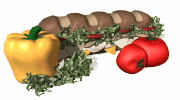
History
of Italian food and new-fangled restaurants in the 1860s, from Venetian Life
by W. D. Howells
![]()
William
Dean Howells, a prominent American writer until his death in 1920, lived
with his newlywed wife in Venice from 1861 to 1865 where he filled the
post of U. S. Consul in Venice under President Lincoln.
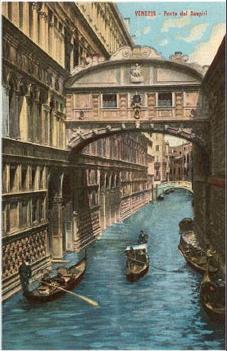 Comments on Italian moderation in food when compared to Northern
Europeans and Americans
Comments on Italian moderation in food when compared to Northern
Europeans and Americans
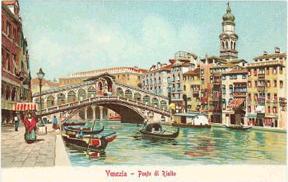 Comments
on the Caffé as public parlors
Comments
on the Caffé as public parlors
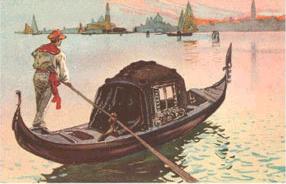 Nowhere in Europe is
the senseless and wasteful American custom of treating known; and
nothing could be more especially foreign to the frugal instincts and
habits of the Italians. So, when a party of friends at a Caffé
eat or drink, each one pays for what he takes, and pecuniarily, the
enjoyment of the evening is uncostly or not, according as each
prefers.
Nowhere in Europe is
the senseless and wasteful American custom of treating known; and
nothing could be more especially foreign to the frugal instincts and
habits of the Italians. So, when a party of friends at a Caffé
eat or drink, each one pays for what he takes, and pecuniarily, the
enjoyment of the evening is uncostly or not, according as each
prefers.
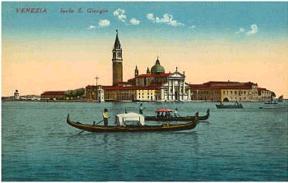 As I
have said, the greater part of the diners at the restaurants are single,
and seem to have no knowledge of each other. Perhaps the gill of
the fiendish wine of the country, which they drink at their meals, is
rather calculated to chill than warm the heart.
As I
have said, the greater part of the diners at the restaurants are single,
and seem to have no knowledge of each other. Perhaps the gill of
the fiendish wine of the country, which they drink at their meals, is
rather calculated to chill than warm the heart. 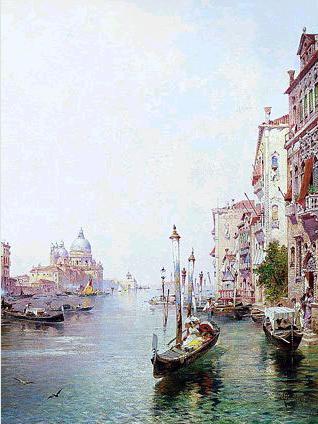 As one descends in the scale of the restaurants,
the difference is not so noticeable in the prices of the same dishes, as
in the substitution of cheaper varieties of food. At the best
eating-houses, the Gallic traditions bear sway more or less, but in the
poorer sort the cooking is done entirely by native artists, deriving
their inspirations from the unsophisticated tastes of exclusively native
diners.
As one descends in the scale of the restaurants,
the difference is not so noticeable in the prices of the same dishes, as
in the substitution of cheaper varieties of food. At the best
eating-houses, the Gallic traditions bear sway more or less, but in the
poorer sort the cooking is done entirely by native artists, deriving
their inspirations from the unsophisticated tastes of exclusively native
diners.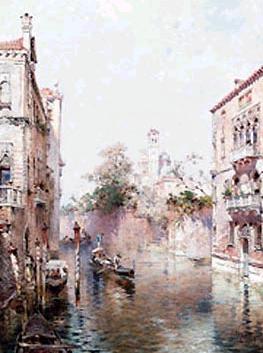 The latter is a true roba veneziana, and
is a loud-flavored broth, made of those desperate scraps of meat which
are found impracticable even by the sausage-makers. Another, but
more delicate dish, peculiar to the place, is the clotted blood of
poultry, fried in slices with onions. A great number of the
families of the poor breakfast at these shops very abundantly, for three
soldi each person.
The latter is a true roba veneziana, and
is a loud-flavored broth, made of those desperate scraps of meat which
are found impracticable even by the sausage-makers. Another, but
more delicate dish, peculiar to the place, is the clotted blood of
poultry, fried in slices with onions. A great number of the
families of the poor breakfast at these shops very abundantly, for three
soldi each person.